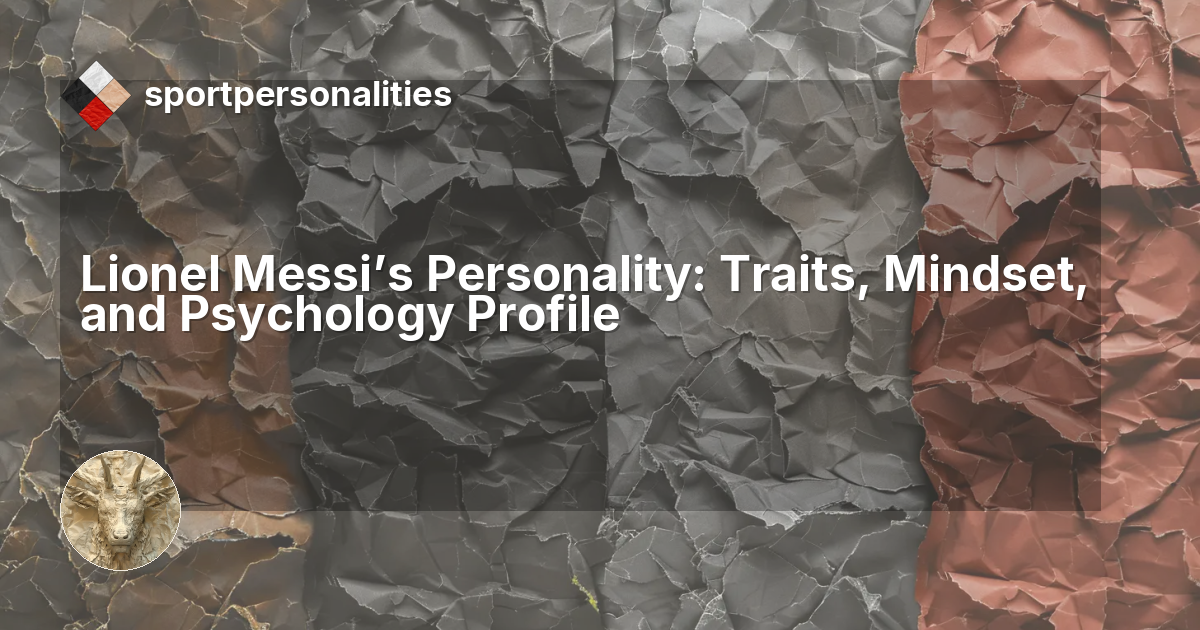Lionel Messi’s Personality Type Explained: What Drives a Legend
In the 2015 Copa América final, Lionel Messi stood in the tunnel before facing Chile, quietly adjusting his teammates' jerseys and offering brief words of encouragement. No theatrical speeches. No chest-thumping bravado. Just a calm presence that seemed to settle the entire squad. This moment, understated yet profound, reveals the essence of Messi's personality type: a rare combination of personal mastery and collaborative spirit that defines  The Harmonizer (ISRC) sport personality type. While most elite athletes chase individual glory or team success, Messi appears to pursue both simultaneously, finding fulfillment in the craft itself while elevating everyone around him. Understanding his mental profile helps explain not just his sustained excellence, but why he achieves it differently than other all-time greats.
The Harmonizer (ISRC) sport personality type. While most elite athletes chase individual glory or team success, Messi appears to pursue both simultaneously, finding fulfillment in the craft itself while elevating everyone around him. Understanding his mental profile helps explain not just his sustained excellence, but why he achieves it differently than other all-time greats.
Lionel Messi Personality Type: The Harmonizer Explained
Based on publicly observable behavior throughout his career, Messi demonstrates characteristics consistent with The Harmonizer sport profile (ISRC), a personality type built on intrinsic motivation, self-referenced competition, reactive cognition, and collaborative  Social Style. This combination is exceptionally rare in elite sport, where extrinsic rewards and opponent-focused intensity typically dominate.
Social Style. This combination is exceptionally rare in elite sport, where extrinsic rewards and opponent-focused intensity typically dominate.
The intrinsic motivation pillar explains Messi's sustained passion for soccer despite achieving every possible accolade. He doesn't play for the next trophy or contract; documented training footage shows him practicing the same dribbling patterns with the intensity of someone discovering them for the first time. This internal  Drive creates resilience against external pressure that would crush athletes dependent on validation. When Barcelona faced financial collapse and public criticism, Messi's performance remained consistent because his motivation source stayed intact, the joy of playing itself.
Drive creates resilience against external pressure that would crush athletes dependent on validation. When Barcelona faced financial collapse and public criticism, Messi's performance remained consistent because his motivation source stayed intact, the joy of playing itself.
His self-referenced  Competitive Style separates him from opponent-obsessed rivals. Messi rarely engages in verbal battles or tactical gamesmanship. Instead, he competes against his own standards of execution quality. Watch him after scoring a tap-in versus a perfectly constructed team goal, the celebration intensity differs dramatically. The latter satisfies his internal criteria for excellence; the former just adds to the tally. This self-referenced approach allows him to maintain focus when opponents employ provocative tactics, staying locked into his own performance standards rather than getting drawn into psychological warfare.
Competitive Style separates him from opponent-obsessed rivals. Messi rarely engages in verbal battles or tactical gamesmanship. Instead, he competes against his own standards of execution quality. Watch him after scoring a tap-in versus a perfectly constructed team goal, the celebration intensity differs dramatically. The latter satisfies his internal criteria for excellence; the former just adds to the tally. This self-referenced approach allows him to maintain focus when opponents employ provocative tactics, staying locked into his own performance standards rather than getting drawn into psychological warfare.
The reactive cognitive approach manifests in his playing style's improvisational brilliance. Messi doesn't appear to follow predetermined patterns or scripted movements. Instead, he processes defensive formations in real-time, making split-second adjustments that seem to defy tactical planning. This cognitive flexibility, combined with his collaborative social style, creates a player who simultaneously elevates individual performance while making teammates better, a psychological paradox that defines The Harmonizer.
Messi's Mental Profile: Four Pillar Analysis
The four psychological pillars that shape Messi's personality type work together to create his distinctive approach to competition and team dynamics.
Intrinsic Motivation (Drive): Publicly documented behavior shows Messi treating training sessions with the same intensity as World Cup finals. His intrinsic motivation means he finds sufficient reward in perfectly executed movements and tactical problem-solving, regardless of external stakes. This drive source creates remarkable consistency, he doesn't need championship pressure to activate his best performance because the activity itself provides fulfillment. However, this trait also explains moments where he appears less emotionally demonstrative than teammates. Athletes driven by intrinsic motivation often experience satisfaction internally rather than through external celebration.
Self-Referenced Competition (Competitive Style): Messi's competitive focus targets personal standards rather than opponent destruction. Observable patterns show him more frustrated by poor execution in victories than satisfied by winning through suboptimal performance. This self-referenced style creates psychological advantages: he remains unaffected by opponent trash talk, maintains consistent performance against weak and strong opponents alike, and avoids the emotional volatility that plagues other-referenced competitors. The challenge surfaces when external competition might strategically benefit the team, Messi sometimes needs to consciously shift toward opponent-focused tactics in elimination matches.
Messi (Self-Referenced)
Measures success through execution quality and personal standards, maintaining consistent performance regardless of opponent strength.
Other-Referenced Athletes
Draw energy from beating specific rivals, often performing better against top opponents but struggling to maintain intensity against weaker competition.
Reactive Cognition ( Cognitive Style): Messi's decision-making happens in milliseconds, processing multiple defensive variables simultaneously without conscious deliberation. This reactive cognitive approach generates his signature unpredictability, defenders can't anticipate his movements because he's responding to real-time information rather than executing predetermined patterns. Analysts describe his dribbling as "reading the game" rather than following technique, a perfect description of reactive cognition at elite levels. The limitation appears in situations requiring extended strategic planning or when coaches implement rigid tactical systems that conflict with his adaptive processing style.
Cognitive Style): Messi's decision-making happens in milliseconds, processing multiple defensive variables simultaneously without conscious deliberation. This reactive cognitive approach generates his signature unpredictability, defenders can't anticipate his movements because he's responding to real-time information rather than executing predetermined patterns. Analysts describe his dribbling as "reading the game" rather than following technique, a perfect description of reactive cognition at elite levels. The limitation appears in situations requiring extended strategic planning or when coaches implement rigid tactical systems that conflict with his adaptive processing style.
Collaborative Social Style (Social Style): Despite his quiet demeanor, Messi demonstrates a profoundly collaborative approach. His playing style inherently involves teammates, the through-balls, the decoy runs he makes to create space for others, the way he orchestrates attacks rather than forcing individual heroics. This collaborative social style differs from vocal leadership; instead, Messi leads through connection and shared purpose. Teammates consistently describe feeling "in sync" with him, suggesting he excels at the non-verbal coordination that defines collaborative athletes. The challenge emerges when leadership situations demand direct confrontation or when he must perform in isolation without the collective energy he draws from.
Why Messi's Personality Type Made Him Dominant
The Harmonizer sport profile creates specific competitive advantages that explain Messi's sustained excellence across two decades. His intrinsic motivation provides immunity to the performance fluctuations that affect extrinsically driven athletes. When external rewards become routine or pressure intensifies, athletes dependent on validation often struggle. Messi's internal drive source remains constant, explaining his consistent performance through Barcelona's turmoil, Argentina's near-misses, and the intense scrutiny that accompanies every match.
His self-referenced competitive style generates psychological stability that opponent-focused players rarely achieve. While rivals obsess over Messi's performance, he remains focused on his own execution standards. This creates an asymmetric psychological advantage, opponents invest mental energy trying to disrupt him while he maintains complete focus on his own game. The result: defenders who successfully limit his goal-scoring often discover they've neglected his playmaking, because Messi shifts to whatever aspect of his game meets his internal standards of contribution.
The reactive cognitive approach combined with collaborative social style creates his unique ability to elevate teammates. Messi processes defensive formations in real-time and instinctively identifies where teammates can exploit space. This isn't conscious strategy; it's pattern recognition happening at subconscious speed, then translated into perfectly weighted passes. His collaborative nature means he finds genuine satisfaction in these assists, not as consolation for not scoring, but as equally valid expressions of excellence.
This personality type also explains his longevity. Athletes driven by extrinsic motivation often struggle when physical decline reduces their ability to achieve external validation. Messi's intrinsic motivation shifts focus naturally, as speed diminishes, he finds fulfillment in refined positioning and tactical intelligence. The craft itself provides satisfaction, so he adapts his game to maintain that internal reward rather than chasing diminishing physical capabilities.
Messi's Psychology in Key Moments
The 2022 World Cup final crystallized Messi's Harmonizer psychology under ultimate pressure. After scoring twice and appearing to secure victory, France equalized in the final minutes. Cameras caught Messi's reaction: not panic or frustration, but immediate refocus on the next play. This response demonstrates self-referenced competitive style, the setback didn't trigger opponent-focused anger but rather internal recalibration toward his own performance standards. In extra time, he scored again, then calmly prepared for penalties with the same composed presence he showed in the tunnel seven years earlier.
The 2019 Champions League semifinal against Liverpool revealed the sport profile's vulnerability. After a 3-0 first-leg victory, Barcelona collapsed 4-0 at Anfield. Messi's reactive cognitive approach and collaborative social style work brilliantly in fluid situations but can struggle when rigid defensive structure is required. His preference for adaptive play rather than disciplined tactical execution contributed to the defensive breakdown. This moment illustrates how The Harmonizer's strengths become limitations when situations demand opponent-focused intensity or tactical rigidity over fluid adaptation.
His Barcelona departure in 2021 showcased intrinsic motivation's psychological protection. Forced to leave the only club he'd known, facing public scrutiny and questions about his future, Messi's performance at PSG remained technically excellent because his motivation source stayed intact. While media debated his legacy, he continued finding satisfaction in the craft itself. The collaborative social style helped him integrate into a new team structure quickly, though the adjustment period revealed how much he'd relied on Barcelona's established connections.
Athletes with Messi's Personality Type
Understanding Messi's Harmonizer sport profile becomes clearer through comparison with athletes showing similar psychological patterns. Tim Duncan demonstrated the same intrinsic motivation and self-referenced competitive style in basketball, consistent excellence without the need for external validation, leadership through quiet competence rather than vocal intensity, and sustained performance driven by internal standards rather than opponent rivalry.
Roger Federer exhibits comparable traits in tennis: intrinsic love for the sport itself, self-referenced pursuit of execution quality, reactive shot-making that adapts to opponents without predetermined patterns, and collaborative relationships with rivals that transcend typical competitive animosity. Both athletes show how The Harmonizer sport profile creates longevity through motivation sources that survive physical decline.
The contrast with other-referenced competitors highlights the sport profile's distinctiveness. Athletes like Michael Jordan or Cristiano Ronaldo draw energy from beating opponents and external validation, creating different psychological dynamics. Neither approach is superior; they simply generate different competitive patterns. Messi's Harmonizer psychology produces consistency and collaborative excellence, while other-referenced athletes often generate peak performances in high-stakes rivalries.
Similar patterns appear in athletes across sports who combine personal mastery with team elevation: basketball players who pursue statistical excellence while making teammates better, distance runners who compete against time standards while training collaboratively, and soccer midfielders who find equal satisfaction in assists and goals. The common thread: intrinsic motivation combined with collaborative social style creates athletes who pursue individual excellence without sacrificing team success.
Discover Your Sport Personality
This article explores one of 16 profiles. Find out which one you are and unlock a personalized blueprint for your athletic journey.
Take the Free TestUnderstanding Messi's Sport Profile: Final Thoughts
Analyzing Messi's personality type through the SportPersonalities framework reveals how psychological traits shape athletic achievement as profoundly as physical capabilities. His Harmonizer sport profile, intrinsic motivation, self-referenced competition, reactive cognition, and collaborative social style, creates a psychological profile optimized for sustained excellence and team elevation simultaneously.
For athletes recognizing similar traits in themselves, Messi's career offers a developmental roadmap. Cultivate intrinsic motivation by finding genuine satisfaction in skill refinement rather than external rewards. Develop self-referenced standards that remain relevant regardless of opponent strength. Embrace reactive processing by trusting intuitive responses rather than forcing predetermined patterns. Build collaborative relationships that enhance rather than diminish individual performance.
The limitations matter too. Harmonizer athletes must consciously develop strategies for situations requiring opponent-focused intensity or rigid tactical discipline. They need to recognize when collaborative tendencies prevent necessary boundary-setting or conflict. Understanding these vulnerabilities transforms them from unconscious weaknesses into manageable challenges.
This analysis is based on publicly observable behavior and career patterns, not personal psychological assessment. The value lies not in definitive categorization but in the framework's ability to explain consistent patterns across decades of elite performance. Messi's psychology, whether labeled Harmonizer or described through different terminology, demonstrates how internal motivation, personal standards, adaptive cognition, and collaborative spirit can create sustained excellence that transcends individual achievement to elevate entire teams.
This content is for educational purposes, drawing on sport psychology research and professional experience. I hold an M.A. in Social Psychology, an ISSA Elite Trainer and Nutrition certification, and completed professional training in Sport Psychology for Athlete Development through the Barcelona Innovation Hub. I am not a licensed clinical psychologist or medical doctor. Individual results may vary. For clinical or medical concerns, please consult a licensed healthcare professional.

